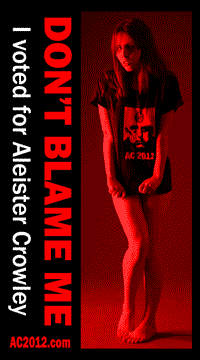Last week, Maine voters repealed a state law which would have allowed same-sex couples to wed, becoming the 31st state in the U.S. to oppose same-sex marriage by a popular vote. Wow. Where do we begin?
A Popular Vote?
Consider John Stuart Mill’s introduction to his essay, “On Liberty” where he explains the depth of danger that a tyranny of the majority presents:
Whatever one thinks of the outcome of the vote in Maine to overturn same-sex marriage, would Aleister Crowley have approved of a public legislative process? It seems doubtful, given his dedicated diatribes and denouncements of doddering democratic deliberations:
What justification can there be for any population to decide what individuals may or may not agree upon between themselves? “Man has the right to live by his own law.”
In Our Proud Opinion
Crowley never wrote about same-sex marriage. He did not apparently contemplate it. He did write about marriage on several planes and in different contexts, and he wrote nothing good at all about family, but nothing whatsoever about same-sex marriage. We’ll get to the things he did say about those related topics in future posts. For now, we offer our own view which is informed by our understanding of the issues as they stand today and in the light of Thelema.
One thing that we feel opponents of same-sex marriage have right is that the question of same-sex marriage opens a Pandora’s Box of non-traditional families, polygamy, line marriages, incestuous marriages and probably a lot more unusual alternative arrangements than we can come up with. But, we’re thinking, so what?
The political and philosophical question of same-sex marriage is not, at its core, just about the marriage of same-sex couples, after all. The underlying question is about people doing what they want, having the relationships they want, calling it what they want, and getting the benefits that are afforded to others in similar relationships.
If all parties agree, the government should simply support and enforce the agreement as it would any other contract. Indeed, we find no reason for the government not to recognize mutually consensual group marriages, incestuous marriages, even unrelated people deciding to call each other brother and have the corresponding familial rights, or forming any other bond of kinship, or domestic partnerships and domestic corporations.
It’s not that we necessarily think people should be doing this whole marriage thing, whatever it is for them. Maybe it’s bad for them, maybe it’s good for them. Maybe it is a convenience, perhaps an expression of love, or not, whatever; we don’t really know or care, as long as there is no property in human flesh. It’s their business.
To the question of whether individuals have the right to name and define their relationships and kinship with others on mutually agreed-upon terms, we answer with an unequivocal “yes.”
In what precise ways should the state be involved in this arrangement?
- In the matter of defining or establishing religious beliefs or social custom, the state should not be involved at all, at all.
- Concerning tax benefits, there should be none at all; in particular, incentives to couple and procreate should be abolished as interference in the natural instincts.
- Questions of insurance benefits, hospital visitation rights, and similar considerations may be left to the private parties in question to negotiate.
Finally, while we might disagree with the unstated assumptions below about the “very limited things” that we all supposedly agree on concerning marriage, we do agree overall with what Dan Savage says on “What the Institution of Marriage Means”:
Don’t see the embedded video? Try this link: http://www.youtube.com/watch?v=-tM0Pg_KKV8
Same Sex Marriage: the Series
In an attempt to consider the fullness of this question of same-sex marriage and the meaning of family, we will devote a series of posts to Crowley’s written thoughts concerning these matters, contractual agreements, cultural norms, love, sex, and more as they relate to the (post)modern issues surrounding same-sex marriage and other alternative forms of marriage.
Remember, we welcome your comments. Come find us on Facebook, Myspace, Twitter, or even email — you might find that we respond with a post!







Pingback: Aleister Crowley for Mayor of London | Aleister Crowley 2012
Pingback: Ron Paul | Aleister Crowley 2012